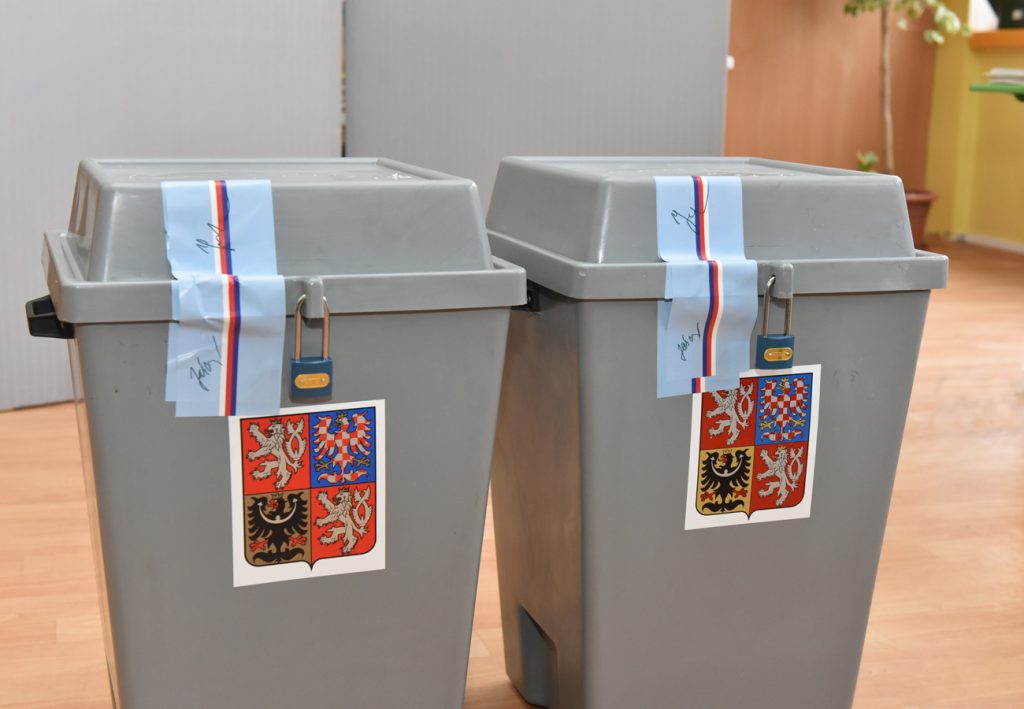Today and tomorrow votes will be cast for municipal and district councils and for two senate representative. Photo Credit: Z. Kolarik, Brno City Municipality.
Prague, Sept 23 (CTK) – On Friday and Saturday, 23-24 September, voters in the Czech Republic will decide on their municipal representatives for the next four years, in local elections to be held simultaneously with the first round of the elections to one-third of the 81-seat Senate.
The second round of the Senate elections will be held one week later.
The junior government Christian Democrats (KDU-CSL) are defending the most seats in municipal assemblies and in the Senate.
Regardless of the Senate election results, it is certain that the government coalition of SPOLU (the Civic Democrats (ODS), KDU-CSL and TOP 09), and PirSTAN (the Pirate Party and Mayors and Independents (STAN)) will retain its majority in the Senate, the upper house of the Czech parliament, despite defending 18 seats out of the 27 contested.
Local elections typically test citizens’ satisfaction with the work of their town halls and local authorities. Groups of unaffiliated candidates are mostly running in villages and small towns. In larger cities and in the Senate elections, where the parties in parliament usually field their candidates, the current situation of high inflation and sky-rocketing energy prices is likely to be reflected in the election results.
In Prague, the election result might also be influenced by the corruption case involving the Prague Transport Company (DPP), in which some junior government ministers and other politicians from STAN have become entangled.
The opposition claims that the upcoming elections will be a referendum on the government of Petr Fiala (ODS). However, voters will not be deciding whether this government should continue or leave power.
Of the governing coalition parties, the Christian Democrats (KDU-CSL) will be defending the highest number of mandates in municipalities. Four years ago, they won 3,645 municipal representatives out of the 62,000 contested, based on the party nominating the candidates. KDU-CSL will also seek to retain the mayoralty of about 300 municipalities. ODS is defending some 2,600 seats, including the mayoralty of five of the largest 26 cities. STAN, with its partner Mayors for the Liberec Region, will be defending 2,750 seats and two mayor’s posts. TOP 09 will be defending 484 seats, and the Pirates 258, including that of Prague mayor, in the local elections.
The senior opposition ANO will be defending 1,684 mandates, including some 60 mayors of small municipalities and 14 of big towns, and the junior opposition Freedom and Direct Democracy (SPD) 161 seats. The Social Democrats (CSSD) will be defending 1,955 seats and the Communists (KSCM) 1,470 seats, despite both of these parties no longer being represented in the Chamber of Deputies.
Like two years ago, 22 of the current 27 senators are defending their mandate, including four of the five members so the upper house leadership: Senate chairman Milos Vystrcil and deputy chairman Jiri Oberfalzer (both ODS) as well as deputy chairmen Jiri Ruzicka and Jan Hornik (STAN).
The KDU-CSL senate group will be defending the most seats, seven of their 12, including that of their group chair Sarka Jelinkova. The nine-member ProRegion senate group of ANO and the CSSD will be defending six mandates, the same as the 24-member STAN group, including its head Petr Holecek. The ODS and TOP 09 group will be defending five of their 27 seats, including group leader Zdenek Nytra (ODS) and deputy leader Tomas Czernin (TOP 09), and the Senator 21 and Pirates group two out of its seven mandates.
The ODS and TOP 09 group, with at least 22 senators after the elections, has the highest chance of being the strongest in the upper house, retaining the right to again nominate its chair.
Notable candidates running for the Senate include actor, businessman and former senator Tomas Topfer (for SPOLU), former senator and lawyer Miroslav Antl (previously for CSSD, now for ANO), heart surgeon Jan Pirk (for TOP 09) and councillor Hana Kordova Marvanova (for ODS).
Meanwhile, ANO has nominated Jana Nagyova, the co-defendant of ANO chairman and ex-PM Andrej Babis in an ongoing subsidy fraud trial, for the Senate, and legendary jockey Josef Vana, who ran unsuccessfully in a previous Senate contest six years ago.
Other Senate candidates this year include ex-Prime Minister and former EU commissioner Vladimir Spidla (CSSD), former Prague mayor Tomas Hudecek (running as an independent), former justice minister Daniela Kovarova (Unaffiliated/NK), former KSCM deputies Hana Aulicka Jirovcova and Leo Luzar, and former MP and chair of the far-right Trikolora movement, Zuzana Majerova.

The second round of the Senate election will take place a week later, on Friday and Saturday 30 September and 1 October. This will definitely not be necessary in the Usti nad Orlici seat in East Bohemia, where only two candidates are contesting the vote, meaning that one of them will definitely be elected in the first round.
More than 8 million voters in the country may participate in the local elections, compared to 8.35 million four years ago, of whom four million (47.3%) actually did so.
This year, foreigners from EU countries with a permanent or temporary residence in the Czech Republic can participate in the local elections.
Six years ago, when the Senate elections were held in the same wards as now, 2.78 million people were eligible to vote; around 933,000 of them (33.5%) voted in the first round and about 428,000 (15.4%) in the second round.
Unlike the elections held in the past two years during the COVID-19 epidemic, some 10,000 voters who are in compulsory isolation due to the coronavirus infection will not be able to vote this time, for which the government was sharply criticised.
In the general election last year, around 1,200 quarantined voters cast their votes in a portable ballot box from their homes, and 1,600 voted from their cars at special polling points.







